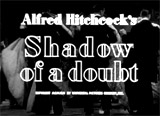
|
Shadow
of a Doubt (1943)
In one of Alfred Hitchcock's most suspenseful thrillers
(and his personal favorite)
- the cynical, film-noirish, war-time film was shot on location in the
small, story-book town of Santa Rosa, California - a representative
place of wholesomeness, law-and order, and middle-American
values within a family. The script by Thornton Wilder (plus Hitchcock's
wife Alma Reville, and New Yorker writer Sally Benson) was
based upon an unpublished, 6-page short story outline titled "Uncle
Charlie" by Gordon McDonell - the source of the film's sole Oscar
nomination. It was remade as the film-noirish Step Down to
Terror (1958) by director Harry Keller.
In the film's main plot, Uncle Charlie, a
psychotic killer whose namesake niece, an adoring teenager-heroine
also named Charlie, was emotionally excited by news of the arrival
of her worldly uncle. Young Charlie has wished for change and excitement
in her boring life, and was psychically linked to her favorite uncle
- but then she slowly began over time to intuitively suspect that
her beloved relative was a wanted mass murderer who had brought dark
corruption with him. A cat-and-mouse game soon developed between
the two Charlies, that turned out to reveal that they were diametrically-opposed
opposites. She used clues including a newspaper article
and an engraved ring stolen from a woman he had murdered to uncover
his homicidal impulses. When Uncle Charlie came to recognize her
suspicions about his evil, murderous secrets, her life became endangered.
The many themes in the film included a belief in superstition
(and good and bad fortunes), telepathy, domestic menace, and the
preponderance of opposites (doubles or twinning).
- during the titles sequence that included views of
Gay Nineties bourgeois couples dancing, the tune of Franz Lehár's
"Merry Widow Waltz" (in Dimitri Tiomkin's Original Score)
played as a thematic leitmotif [Note: A real-life mass murderer
in the mid-1920s named Earle Leonard Nelson, dubbed with the macabre
nickname "Merry Widow," strangled middle-aged women until he was hanged in 1928.]
- the opening sequence introduced the chilling, twisted,
devious homicidal character of Uncle Charlie Oakley (Joseph Cotten)
- the "Merry Widow Murderer" - evil personified from
the very first scenes, as he laid on a bed in a Dracula-like vampirish
position; he knew that two men were looking for him: "They aren't
exactly friends of mine. They've never seen me. That's odd, isn't
it?", and then dared them from his window to locate his evil guilt: "What
do you know? You're bluffing. You've nothing on me"
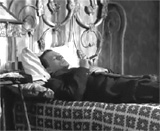
|
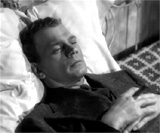
|
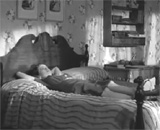
|
|
Uncle Charlie (and Young "Charlie") Similarly Lying
on Bed in Two Different Locations
|
- Uncle Charlie elusively disappeared and fled from
Philadelphia, after committing a third murder of a rich widow by
strangulation; he suspected that his apprehension by police was
imminent, and schemed to drop out of sight by sending a telegram
about his visit and arrival to his adoring, middle-class relatives,
including his unsuspecting, talkative, oblivious older sister Mrs.
Joseph (Emma) Newton (Patricia Collinge) in California
- members of the Newton family included precocious
teenaged daughter "Charlie" (Charlotte)
Newton (Teresa Wright), Charlie's symbiotic namesake and his young
favorite niece, two additional younger children: congenial Roger
(Charles Bates) and 9 year-old, spectacle-wearing, bookish Ann
(Edna May Wonacott), and Emma's bank clerk husband Joseph Newton
(Henry Travers); Young Charlie was introduced lying fully dressed
in the same supine position on her bed as her Uncle Charlie in the first scene
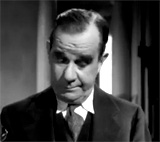
Joseph Newton (Henry Travers)
|
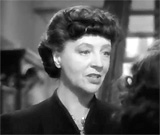
Mrs. Joseph (Emma) Newton (Patricia Collinge)
|
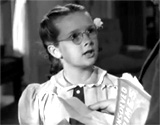
Ann (Edna May Wonacott)
|
- Uncle Charlie's train arrived in the clean, quiet,
small and traditional, bright town of Santa Rosa, California, as
black funereal smoke belched into the sky and a dark, tarnishing
shadow was cast over everything to symbolize his ominous arrival;
his coming into the town, walking first hunched over and
with a walking stick, suddenly changed - he was walking erect,
smoking a phallic cigar, bringing sexual tension and hiding his
proclivities toward sexual violence and incestual interest in the
Newton's family niece; during Charlie's visit, Joe offered "Charlie" to
give up her room to her Uncle
- the first evening following dinner after
Uncle Charlie had presented gifts to everyone, he met privately
in the kitchen with the elated young "Charlie" who mentioned telepathic
twin-ness similarities and affinities between her congenial and
suave Uncle Charlie and herself - she was named for the uncle she
idolized: ("I can't explain it but you came here and Mother's so happy and I'm glad
that she named me after you and that she thinks we're both alike.
I think we are too. I know it. It would spoil things if you should
give me anything....we're not just an uncle and a niece, we're
something else. I know you...we're sorta like twins, don't you
see?"); she placed her hand trustingly in his as he 'wed' his twin with his
gift of an emerald ring; she was overjoyed, but Uncle Charlie became
apprehensive when she noticed its initial engravings: ("'TS from
BM' - those must be someone's initials") and refused to return it
- as young Charlie returned to the dining room, visions
of the waltzing couples in the ballroom from the beginning of the
film (and from the idealized past) were superimposed over him -
mysteriously marking and linking him - along with the humming of
the tune of the Merry Widow Waltz
- the film was enriched by the running dialogue between
Joseph and his neighbor and brother-in-law Herbie Hawkins (Hume
Cronyn in his film debut), who morbidly debated and were obsessed
about the best techniques to commit the 'perfect murder' - both
were mystery buffs who read pulp murder-mystery crime stories;
after dinner they retreated to the front porch; Joe seemed to be
more interested in getting away with murder, while Herb showed
greater attention to planning, the planting of detailed clues and
elaborate killing methods
- later in the evening, Uncle Charlie suspiciously
and cleverly absconded with a page from the family's newspaper
in the living room, possibly because of an offensive article on
pages 3-4 of the paper; in his room later in the evening, young
Charlie spotted her uncle's coat pocket bulging with part of the
evening's newspaper and revealed her knowledge of his hidden secret;
she closed the door and triumphantly announced how she had penetrated
into his concealment and knew he was hiding something; she grabbed
the missing newspaper page with a gaping hole and held it up to
him; he grabbed and gripped her wrists tightly, and violently wrenched
down on them - causing her fearful shock, pain, and anguish: "Uncle
Charlie, you're hurting me"; he excused his behavior by claiming
the paper had a gossip article about a friend
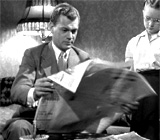
Uncle Charlie Cleverly Removing Two Pages from the
Newspaper
|
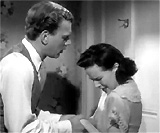
Young Charlie Briefly Assaulted by her Uncle
Charlie For Noticing Stolen Newspaper Pages
|
- the next morning, Uncle Charlie's older sister
Emma informed him that she had agreed to have the family interviewed
and photographed as a typical or representative American family
by the local newspaper; Uncle Charlie angrily disapproved that
she had given permission for "two strangers"
to interview them and take pictures of their "typical American
family" life - exposing them "to a couple of snoopers"
- a possible explanation for Charlie's aberrant behavior
arose when Young Charlie fetched and produced an old photograph of
her Uncle as a child; Emma recalled that he had suffered a terrible bicycle accident and
skull fracture that nearly killed him when he was a child; the
life-altering incident utterly changed him forever, and he would
regularly "get into mischief"
- as he had proposed the night before, Uncle Charlie
visited the local bank to transfer some money ("Thirty or
forty thousand, just to start things off right") from the
East and put it into Joe's bank after opening up an account; at
the bank, a vain middle-aged woman Mrs. Potter (Frances Carson) flirtatiously
admitted to being a rich widow (a "merry widow"?) who
delighted in spending her late husband's money
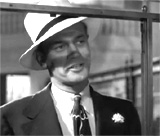
Uncle Charlie at the Bank Depositing $40K Into a
New Account
|
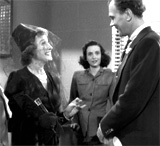
Mrs. Potter (Frances Carson) - Uncle Charlie's Rich
Widow Acquaintance - A New Possible Victim
|
- at first, young Charlie was fascinated by her uncle's
wit, urbane and worldly sophistication - but then a "shadow
of a doubt" slowly began to emerge; the first suspicions about
Uncle Charlie arose when he vehemently refused to
take the government's national poll survey and have his photograph
taken by interviewer Jack Graham (Macdonald Carey) and photographer
Fred Saunders (Wallace Ford)
- after lunch in town, the group returned home and
met up with the government survey-takers or "questionnaire
men"; Uncle Charlie was immediately wary
of them, but Charlie promised to protect his privacy, and made the
two agree to restrict their questioning and exclude him; however,
when the men ventured upstairs, Fred Saunders
had an opportunity to photograph Charlie's empty room - because Uncle
Charlie had mysteriously disappeared; when he suddenly returned by
the back stairs, Saunders took the opportunity to snap an unpermitted
photo of him; Uncle Charles snapped - he angrily and hurriedly
confiscated the roll of film to his niece's troubled consternation
(had Saunders swapped the film roll with another one?)
- that evening, Charlie received Emma's permission
for Jack Graham to "borrow" her
for the evening as a guide around town, and they went for a Friday
night dinner at Gunner's Grill, followed by a visit to a downtown park;
Graham revealed to an already-suspicious but still-stunned young Charlie that both
he and Saunders were police detectives looking for a "hunted" man;
they were specifically investigating her Uncle Charlie as a murder
suspect ("This man we want may be your uncle"); he convinced her
to vow secrecy, and promised that if Charles was their man, he
wouldn't be arrested in front of her mother to spare her feelings;
as they said goodnight outside her home,
she told him that she still had faith in her uncle
- in an amusing, intervening sequence, mystery critics
Herb and Joe engaged in a second conversation in the film - about
killing each other with poison
- later that evening in an increasingly-suspenseful
and tense sequence, young Charlie snuck out by the back stairs
and rushed to the town's Free Public Library just as it was closing
at nine pm, to view the contents of the torn-out article that Uncle
Charlie had suspiciously taken from her father's newspaper; rushing
along, she was heedless of traffic and was reprimanded by a cop
at an intersection ("Get back!"); at the library's front door,
the stern, old-maid librarian (Eily Malyon) allowed her inside
for three minutes after young Charlie pleaded and begged
- in the reading room, young Charlie reacted dramatically
-- her eyes widened as she found damning evidence that her Uncle
was the "Merry
Widow Murderer -- Strangler of Three Rich Women" - and that
he was the object of a nationwide search
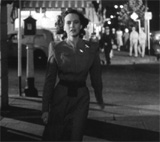
|
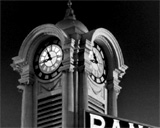
|
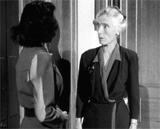
|

|
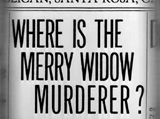
|
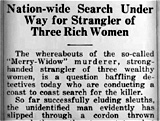
|
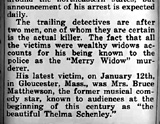
|
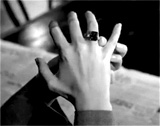
|
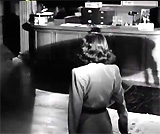
|
|
The Town Library Sequence - Young Charlie's Discovery
of Her Uncle's True Identity
|
- she also put two-and-two
together - the initials engraved on the back of the emerald ring
given as a gift to her by Uncle Charlie matched the initials of
the murderer's third widowed victim (Thelma Schenley (TS) from
husband Bruce Matthewson (BM)) - it was the film's major turning
point - emphasized by the camera's overhead shot isolating her
at a distance from behind - among the dark shadows; it was undeniable
that her Uncle Charlie was guilty; again, the image dissolved into
the dancing, revolving 'Merry-Widow' couples on the ballroom floor
- in a key dinner table speech the next evening (staged
as practice for a speech he had promised to give to the town's
womens' club), a contemptuous, misogynistic monologue was delivered
by Uncle Charlie - about his hatred for rich, lazily fat, detestable,
middle-aged widows; he was viewed in profile for most of the explosive
speech, as the camera moved even closer: "...Women keep busy
in towns like this. In the cities it's different. The cities are
full of women, middle-aged widows, husbands dead, husbands who've
spent their lives making fortunes, working and working. Then they
die and leave their money to their wives. Their silly wives. And
what do the wives do, these useless women? You see them in the
hotels, the best hotels, every day by the thousands, drinking the
money, eating the money, losing the money at bridge, playing all
day and all night, smelling of money. Proud of their jewelry but
of nothing else. Horrible, faded, fat, greedy women"
- midway, when young Charlie objected to his degrading assessment and characterization:
("They're alive! They're human beings!"), Uncle Charlie turned
toward the camera, in gigantic close-up and coldly asked: "Are
they? Are they, Charlie? Are they human or are they fat wheezing animals,
hmm? And what happens to animals when they get too fat and too old?"
- after dinner, Herb wandered in again and commenced
another discussion about more murder techniques (besides blunt instruments or poison
in coffee) - poisonous mushrooms and drowning in a bathtub; Charlie
expressed her upset about her father's preferred way of 'relaxing':
"Oh, what's the matter with you two? Do you
always have to talk about killing people?"
- slightly later after she dashed outside from the
table and was pursued by Uncle Charlie, the two entered the nearby 'Til-Two cocktail
lounge - a smoke-filled, noisy and dark bar populated by war-time
sailors and less-than-respectable, downtrodden ladies both inside
and out; the two Charlies sat at one of the booths for an ominous
discussion; at first, they faced each other as the mentally-disturbed
Uncle Charlie began to act aggressively toward his niece: ("...Now
look, Charlie, Something's come between us. I don't want that to
happen. Why, we're old friends. More than that. We're like twins.
You said so yourself...."); she took the emerald ring from her
pocket and returned it to him by placing it on the table, as their
drink order was brought
- during their booth conversation, he
told her how she hadn't experienced - as he had - how the world
was a living hell filled with foul swine within houses; he began
lecturing her, accused her of knowing nothing about the real world,
and confronted her about what she knew about him: "You
think you know something, don't you? You think you're the clever
little girl that knows something. There's so much you don't know.
So much. What do you know, really? You're just an ordinary little
girl living in an ordinary little town. You wake up every morning
of your life and you know perfectly well that there's nothing in
the world to trouble you. You go through your ordinary little day
and at night you sleep your untroubled, ordinary little sleep filled
with peaceful, stupid dreams. And I brought you nightmares! Or did
I, or was it a silly inexpert little lie? You live in a dream. You're
a sleepwalker, blind. How do you know what the world is like? Do
you know the world is a foul sty? Do you know if you rip the fronts
off houses, you'd find swine? The world's a hell. What does it matter
what happens in it? Wake up, Charlie! Use your wits. Learn something"
- as she approached closer to him and learned the truth,
she realized that he was aware of her knowledge and suspicions; she had
to decide whether she should reveal her findings to the authorities or protect her family
- after her confrontation
in the seedy bar with her uncle, she departed as they continued to
discuss Uncle Charlie's future in town; she reluctantly agreed
to not say anything if he promised to leave town in a few days,
to avoid any scandal and to protect her mother from knowing that
her younger brother was a murderer
- the next day, after Sunday morning church, Charlie
spoke with Saunders who told her they were awaiting word about
the picture he had secretly taken of Uncle Charlie, to see if he
was identified as their suspect; Saunders suggested that she encourage
her uncle to leave town "within a couple of hours" and
she vehemently agreed: "I'll make him leave. I'll make him"
- the film's plot was turned upside-down when a noon
broadcast heard by Herb reported to Joe about the death of another
Merry Widow Murderer suspect in the state of Maine as he fled
from police [Note: The other murder suspect, actually innocent, died a horrible death at
an airport when he was fleeing from police and ran into a plane propeller.]
Joe and Herb were blissfully ignorant of the criminal murderer
in their own midst; both young Charlie and her Uncle overheard the revelation
- Uncle Charlie was relieved and exultant, and lept
up the stairs, two at a time, but then he turned when he sensed
that she been looking at him from the outside porch; he slowly
turned and faced the camera, and noticed her framed in the doorway
and matching his look; she was the only remaining threat
that wouldn't let him off the hook, and still held his secret; the
scene faded to black
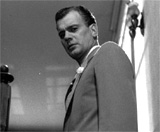
|
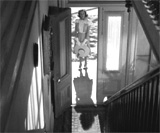
|
|
Uncle Charlie Sensing That Charlie Was Still a Deadly
Threat
|
- Jack Graham arrived and he and young Charlie retreated
to the garage where he notified Charlie that their search and job
had ended; he also felt compelled to tell her of his love:
"I love you, Charlie. I love you terribly. I know it's no
time to tell you now and I'm sorry. Do you mind?"; she responded:
"I'd like us to be friends. I know that. Well, we are friends"
- Uncle Charlie was relieved (and knew that Charlie
no longer had his emerald ring as evidence against him), but still
felt he wanted to remain in Santa Rosa, but that meant that he
had to eliminate young Charlie - he made two failed 'murder' attempts
to kill her - first by a tampered-with broken step on the
back stairs; they had a clash of wills as they faced
each other in dark silhouettes: (she told him: "So
go away, I'm warning you. Go away or I'll kill you myself");
- and then, while everyone was preparing to depart
and attend Uncle Charlie's Women's Club lecture, Uncle Charles' second 'murder'
attempt was implemented - a malfunctioning garage door paired with toxic fumes of carbon monoxide
poisoning; when Uncle Charlie realized that his plan had failed,
he pretended to rescue young Charlie; as a result of the incident,
Charlie elected to stay behind and prepare for the after-lecture
party for the guests
|
Uncle Charlie's Two Failed Attempts
to Kill Young Charlie
|
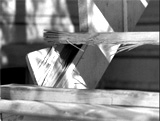
The Back Stairs Step
|
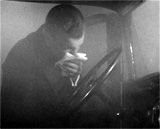
|
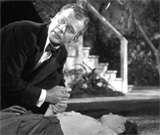
|
|
Carbon Monoxide Poisoning in the Garage
|
- while everyone was at the Sunday night lecture,
young Charlie frantically tried to call Graham but couldn't reach
him; then, she searched in her Uncle's room for the allegedly misplaced
emerald ring (that she had given back to her Uncle); once everyone
returned from the talk, in an intense tracking shot from her Uncle
Charlie's POV, young Charlie was seen gliding down the stair railing
in a dramatic entrance, with the incriminating, offensive, condemning
object (the emerald ring) framed in a gigantic closeup on her right
hand
- Uncle Charlie surrendered to her by announcing to
everyone at the post-lecture reception that he was departing on
the train for San Francisco the next day (on the same train as
widowed Mrs. Potter, his next victim)
- after farewells at the station, Uncle Charlie held back his young niece
Charlie from exiting his train car; in the thrilling concluding scene
on the moving train in the platform between train cars, there was
a struggle between them as the train began to move faster; he seized
her as she panicked and tried to break away. His face was absolutely
monstrous as he advanced on her; she struggled into the space between
the cars, while he gripped her mouth and throat and opened the
door to fling her onto the tracks
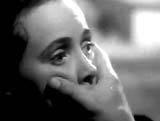
|
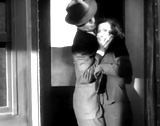
|

|
|
The Struggle Between Them On the Train
Platform Between Cars
|
- Uncle Charlie explained his homicidal intentions: "I've
got to do this, Charlie, so long as you know what you do
about me." He twisted her around in his tight embrace, as
she grappled with him. He lifted her off the ground - her legs
dangled in the air. Her black-gloved hand gripped the door handle
and then lost its hold

|

|
|
Uncle Charlie's 3rd Failed Murder Attempt
of Young Charlie on Train - Death of Uncle Charlie
|
- both watched the passing
blur of landscape and tracks (two parallel railway tracks became
one), delaying the inevitable plunge into death; Uncle Charles prepared
her by waiting for the right moment of lethal speed and exhilaration
(and sexual receptiveness), educating her to the monstrous world
that he earlier said she must learn - as his twin: "Not yet,
Charlie, let it get a little faster! Just a little faster! Faster!
Now!" She twisted and reversed positions on him, upset his balance and pushed
him away - he fell headlong into the path of an oncoming, speeding
train on an adjacent track. Her act freed him from his (and her)
nightmares and from his curse to kill - she fulfilled her earlier
threat ("I'll kill you myself"),
aiding her uncle to embrace death
- the image dissolved to the recurrent
one of dancing couples twirling to the Merry Widow Waltz
- a huge and impressive funeral procession on the
spectator-lined streets of Santa Rosa was held for Uncle Charlie
that ended up at the town's church; only Young Charlie and Jack
Graham, who stood together, knew of her Uncle's murderous past
but kept it a secret, and let the town believe that her Uncle died
in an accident; in contrast to the glowing tribute being delivered
in the church by a clergyman, Charlie's view of the world was no
longer idealistic after the horrors of the world were revealed
to her through her evil uncle's view of the world; Jack's similarly
skeptical view of the world echoed Uncle Charlie's cynicism
|

Uncle Charlie: The Suspected 'Merry Widow Murderer' Pursued by Two Men
in Philadelphia
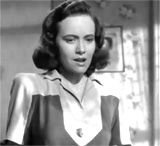
"Charlie" (Charlotte) Newton (Teresa Wright)
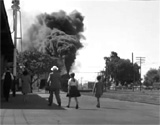
Black Smoke Signaling Charlie's Arrival

"Uncle Charlie" Arriving
in Santa Rosa, CA

Young Charlie Greeting her Uncle at the
Train Station
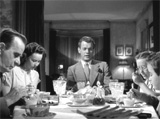
Uncle Charlie at the Head of the Dinner Table
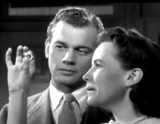
Uncle Charlie's Presentation of a Gift of an Incriminating,
Engraved Emerald Ring to Young Charlie in the Kitchen

The Film's Leitmotif: "The Merry Widow" Waltz, With Dancing
Couples

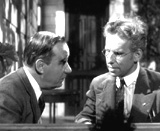
Joe's Neighbor
Herbert Hawkins (Hume Cronyn) - He and Joe Were Both Murder Mystery Buffs
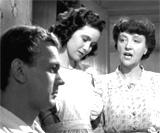
Uncle Charlie Listened as Emma Described His Life-Altering Bicycle Accident
When He Was a Child
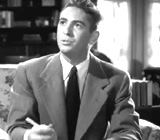
Government Survey Taker - Jack Graham (Macdonald Carey)
- Eventual Love Interest for Young Charlie
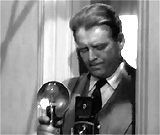
Photographer Saunders - Snapping an Unpermitted Picture of Uncle Charlie
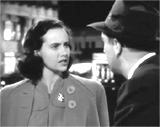
Jack Graham Revealed Himself to Young Charlie As a Detective Trailing
Uncle Charlie as a Murder Suspect
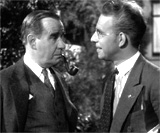
A Second Conversation Between Joe and Herb About Killing
Each Other With Poison

"Horrible, faded, fat greedy women!"

"Are they? Are they, Charlie?"

Close-up of Uncle Charlie Viewed in Profile During His
Hateful Dinner Table Speech About Detested Widows
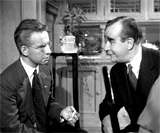
A Third Discussion of Murder Techniques Between Herb and Joe
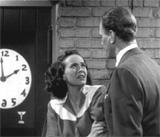



Ominous Discussion Between Uncle Charlie and Young Charlie
in a Bar Booth in the 'Til Two Cocktail Lounge

Uncle Charlie Promising to Leave Town in a Few Days
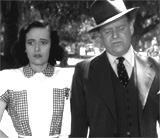
Saunders Informing Charlie That They Were Awaiting Word on the Picture
He Took of Uncle Charlie
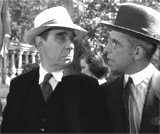
Herb Informing Joe of News About The Alleged Merry Widow Killer Who Had
Died
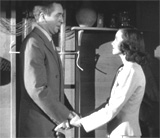
In the Garage, Graham Telling Charlie of His Love For Her
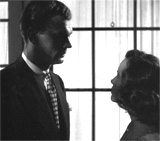
Clash of Wills - Young Charlie Told Her Uncle: "Go away or I'll kill
you myself"

Charlie's Dramatic Entrance: The Tracking Shot of The Incriminating
Emerald Ring on Young Charlie's Finger
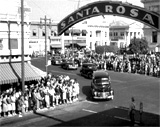
Ending: Santa Rosa Funeral for Uncle Charlie
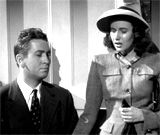
Jack Graham and Young Charlie Keeping Uncle Charlie's Secret to Themselves
|
































